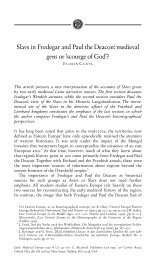A READER IN COMPARATIVE INDO-EUROPEAN MYTHOLOGY
A READER IN COMPARATIVE INDO-EUROPEAN MYTHOLOGY
A READER IN COMPARATIVE INDO-EUROPEAN MYTHOLOGY
Create successful ePaper yourself
Turn your PDF publications into a flip-book with our unique Google optimized e-Paper software.
attributable to Indo-Aryans, such as the «Gandhara Grave Culture» in the Swat valley in<br />
Pakistan (in the early 2nd Millennium BC) have left us equally scarce remains.<br />
Principal Vedic gods are the following: Indra- (of unknown origin, no relation whatsoever to<br />
OCS jędrъ „strong, quick“, Russ. jadró 'kernel, core') is celebrated in many hymns as the<br />
slayer of the dragon Vrtra-, and many linguists see in this a reflex of the Indo-European<br />
dragon-slaying myth. The name of Mitra- comes from the abstract noun mitrá- „contract“,<br />
from the PIE root *mey- 'exchange', OCS minąti 'pass', Latv. miju 'exchange', Ved. mi-<br />
'exchange'. He is a deity with chiefly social function, closely parallel to Avestan Miθra. On<br />
the other hand, Varuṇa- is the god who binds the souls of the dead, but he is also a healer and<br />
a watcher over the social order. His name probably comes from the root *wel- „to close,<br />
cover, ensnare“, Gr. élytron „covering, case“; contrary to the opinion of many famous<br />
linguists, it bears no relation whatsoever to Slav. Velesъ). The Aśvinā(u) are the divine twins,<br />
comparable to Greek Dioskuri Kastor and Polydeuces. The adduced form of their name is<br />
thedual, literally meaning „horsemen“, from *h1ek'wo- „horse“, Skr. áśva-. Ušās- is the<br />
dawn-goddess, and her name is the word for „dawn“, PIE *h2ewsōs, Gr. ēṓ s, etc.. On the<br />
other hand, Rudrá- is the god of the disease (which, like Apollo, he disperses with his<br />
arrows), and of healing. His name may be derived from PIE *(H)rewd- „be coarse“ (Lat.<br />
rudis). His sons are the Maruts, who often accompany Indra; their name is still unexplained.<br />
Some linguists connect it with Lat. Mars (though this is actualy from older Mavors), while<br />
others connect it with the name of the young warriors, the marya-, or with the PIE word for<br />
'sea' (*mori- > Lat. mare); since the Maruts are connected with the wind, the form mar-ut<br />
could have originally meant something like '(the wind) from the sea-side', but I don't find this<br />
very convincing. Otherwise, the god of the wind is Vāyú- (also the Sanskrit word for „wind“,<br />
PIE *weh1-yu-, cf. Lith. vėjas, Lat. vēntus). The name of Parjánya- also has unclear<br />
etymology, often connected to Lith. Perkūnas etc., but this may be just a chance<br />
correspondence; as a comon noun, parjánya- means „rain cloud“. On the other hand, Dyauš is<br />
clearly the sky-god, and his name is also the word for „sky“, PIE *dyēws, cf. Gr. Zeús. Agni-<br />
is the deified fire (= agni- „fire“ < *ng w ni-, Lat. ignis), while Rātrī- „Night“ derives her name<br />
from the root rā- „to bestow“, rātí- „gift“ < PIE *(H)reh1-, cf. Lat. rēs „thing, wealth“). The<br />
name of the divine drink Sóma- litterally means „what is being pressed, from *sew- „to<br />
press“, Ved. su-. Višṇu-, who latter became one of the chief Hindu deities, bears a name of<br />
unclear etymology, despite attempts to derive it from viś- „village“, (Lat. vīcus, OCS vьsь,<br />
etc.); he is said to have measured the world in three steps, corresponding to the three spheres<br />
in the Vedic cosmology: the sky, the earth, and the space in between. The name of Savitár-<br />
has been rather plausibly interpreted as „the impeller“, from the root *sewH- „to impel,<br />
drive“. The sun-god, Sū́ rya-, bears the name identical to the Vedic word for 'sun', from PIE<br />
*seh2wōl- 'sun' (Lat. sōl, Lith. saulė, etc.); like his Greek counterpart, Hḗ lios, he is often<br />
depicted as driving a golden chariot accross the sky. The divine twins, Yama- and Yamī-<br />
derive their names from the PIE word for 'twin' (*yemo-, OIr. emain). These are only one of<br />
several deities that are usually mentioned as couples, e.g. Mitrā-Varuṇā- (or simply Varuṇā,<br />
in the dual) 'Mitra and Varuna', Dyavā-Pṛthivī 'heaven and earth', etc. There are also<br />
abstract deities, such as Vāk- 'the Word' (cf. Lat. vōx 'voice, sound'), Bṛhas-pati- 'lord of<br />
the prayer', Aditi- 'liberty', literally 'un-binding', whose sons are generally called āditya-



